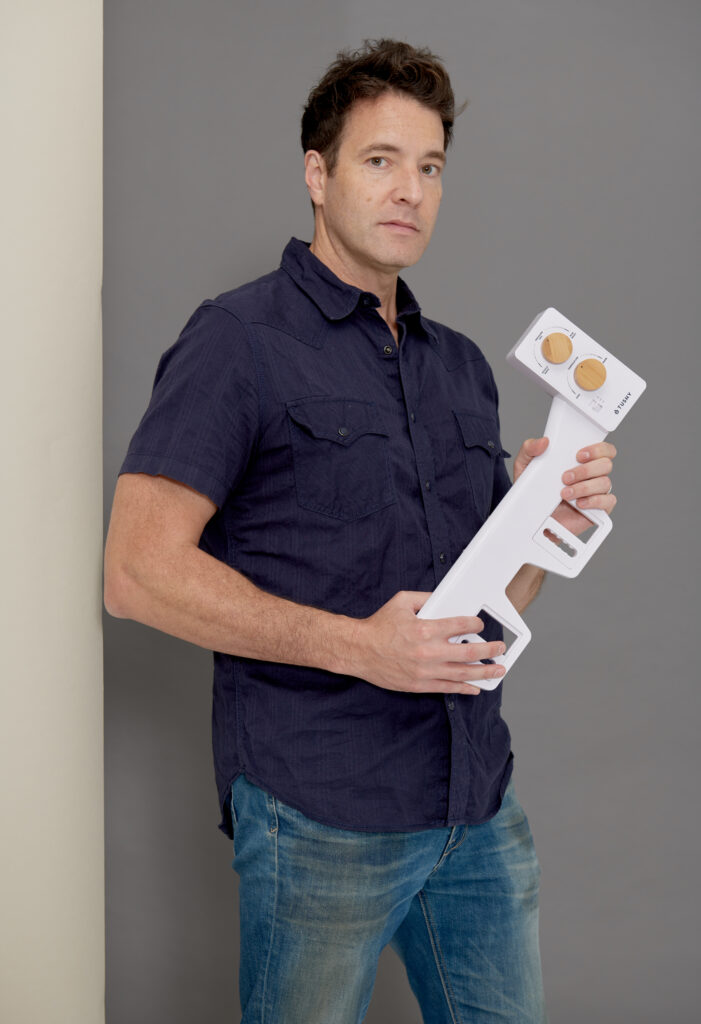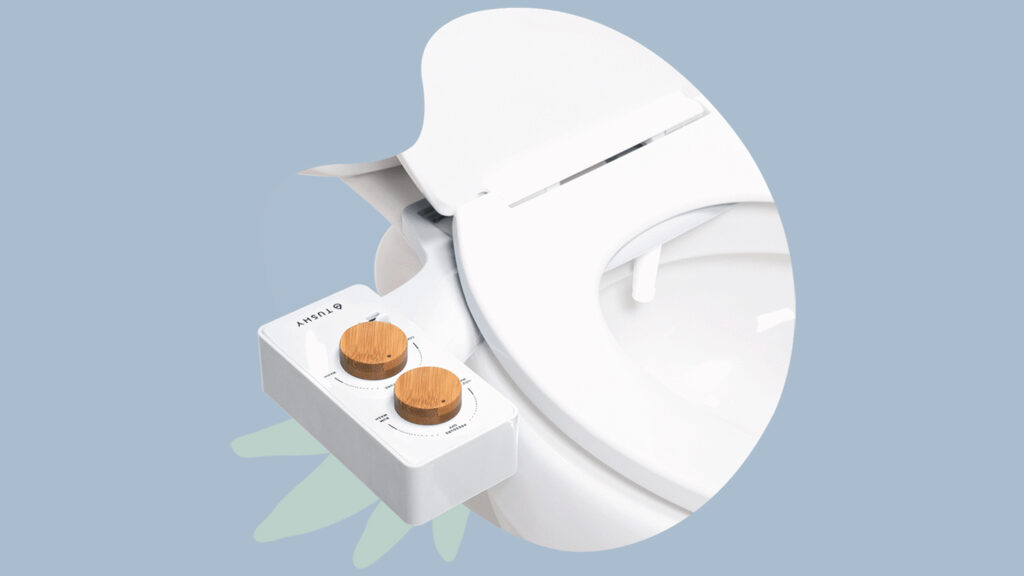By Bryan Hay
As the people across the nation respond by over-buying household supplies, customers of a Brooklyn company have avoided the stressful stockpiling of rolls by turning to the bidet.
Under the leadership of Jason Ojalvo ’92, TUSHY is working to end the paper chase by introducing Americans to the miniature, bathtub-like apparatus developed in France in the 1600s to improve personal hygiene. Americans traveling for the first time in Europe or Asia are often puzzled by the purpose of the porcelain bowl with the odd-looking, if not intimidating, sprayer sitting adjacent to the toilet in the bathroom.

There’s no doubt that toilet paper shortages have helped TUSHY’s bottom line in recent weeks. But it’s also been a watershed moment that’s helping the environment by reducing the need for toilet paper and improving hygiene as households hunker down amid the uncertainties of the coronavirus outbreak. TUSHY’s products are manufactured in Asia, where factories are open and running; its business office in Brooklyn has been closed since March 12, and employees there are working from home.
Ojalvo, CEO of TUSHY, took time from his busy schedule to talk about the company and its products, how they are helping people cope during a difficult time, and how Lafayette College prepared him to work in an industry that, until recently, has been unfamiliar to most Americans.
What inspired you to get involved with TUSHY?
I was hired as CEO two years ago, which was about three years after the company was founded. I loved everything about the company: its sustainable mission to save trees from being chopped down, its irreverent sense of humor, and its potential to play a disruptive role in changing people’s longstanding behavior. When I met TUSHY founder Miki Agrawal (also the founder of THINX, ICON, and WILD restaurants), I knew that, working together, we could be the company to make bidets mainstream in America. That’s a huge and virtually untouched market. We weren’t competing in a market, rather we were creating a market. That kind of opportunity is extremely rare.
How did your English degree and Lafayette education help support your entrepreneurship and interest in this venture?
Oh, man, being a company leader is all about communication. Being an English major at Lafayette proved very valuable in literally every job I’ve ever had. Writing documents, emails, and proposals that explain your ideas, suggestions, requests, and logic. My first job after Lafayette involved me writing a music industry newsletter, so there’s an obvious connection to being a writer and being an English major.
My use of my A.B. English degree probably reached its zenith during my tenure at Amazon, when I’d have to write Amazon’s traditional (and much written-about) six-page documents to explain my business plans for all the divisions and business units that I was running at the time. The “six-pagers,” as they’re commonly called, had to be understandable to Amazon executives who didn’t necessarily know anything about my business. So these documents would dive deep into the past, present, and future of my business, and ultimately persuade the reader to approve my proposed strategy and requested budget for the coming year. Every word mattered in those documents.
For those who may not know, or may not want to know, what is a bidet and how is it used?
A bidet is kind of like a car wash for your butt. It attaches or sits next to your toilet and washes your bum with a refreshing stream of clean water after you poop.
Since the late 1800s, we have been led to believe that toilet paper does the job, but all it does is cost us money every month (to the tune of billions of dollars per year if you add us all together), kill millions of trees per year, and cause chronic infections and disease down there. I mean, would you jump into your shower, not turn on the water, and start wiping down your body with dry paper? People would call you crazy.

What distinguishes a TUSHY bidet from others on the market?
TUSHY makes bidet attachments that fit any standard toilet in as little as 10 minutes, with no plumbing experience or electricity required. Unlike the expensive, high-tech toilets and bidets that you’ll find in countries like Japan, TUSHY is as simple as it gets. Our simple, modern design has just three control options because cleaning your butt shouldn’t be a science. Our controls let you choose your water pressure, temperature, and nozzle angle to hit the bullseye every time.
Our most popular model is the TUSHY Classic ($79), a single-temperature bidet attachment, and we also have the TUSHY Spa ($109), which offers temperature control—though note it must be near your sink. Both bidets are self-cleaning and give you complete control of the water pressure and angle for a targeted spray on your pooper. All come in a range of colors with options of bamboo or metallic buttons. We even have a TUSHY Travel ($29), for when you have to go on-the-go.
Your website shows that your products are on backorder. How have sales increased since the coronavirus outbreak?
TUSHY sales are 10 times what they were since word spread of toilet paper shortages. We even had a day where we hit $1 million in sales. I am confident that bidets will replace toilet paper and that TUSHY is going to be the brand to help realize it. Our goal has always been to save the 15 million trees that are getting flushed down every year, save billions of gallons of water required to make the toilet paper, and actually help clean American bottoms properly once and for all.
These last two weeks have created a completely new normal for our company, solidifying TUSHY as a modern bathroom brand, and that goes beyond our bidets—we have the most aesthetically beautiful toilet stool on the market, bamboo toilet paper, organic bamboo towels, and other designer bathroom products on the way soon.
We’re currently taking pre-orders for the TUSHY Classic and TUSHY Spa, offering a ship date of only a few weeks from now. We’re working hard to expand our production capacity and expedite shipping so that we can meet demand and keep as many butts as clean as possible.
Why hasn’t the bidet been more widely accepted in the U.S.?
While mostly cultural, price is also a big factor, which is why TUSHY is trying to shift culture and the way we clean ourselves down there by making bidets more accessible and relatable.
How does toilet paper use decrease if there’s a bidet in your home?
On average, Americans use 57 sheets of TP every single day. We use 36 billion rolls of toilet paper every year. This alone results in the loss of 15 million trees, 437 billion gallons of water, and 253,000 tons of bleach. TUSHY uses only about one pint of water when it washes, and then you need only a few sheets of toilet paper to pat dry, reducing your TP use by up to 80%.
In this new age of hyper cleanliness, how does a bidet contribute to better hygiene?
Bidets support better health and hygiene and can protect your booty from infection and disease. Reports have shown that wiping with dry paper or wet wipes contributes to 30 million annual cases of hemorrhoids, urinary tract infections, yeast infections, anal fissures and itching.
Please describe your travel bidet.
The TUSHY Travel is collapsible and expandable for discreet portability, so you can take it to work, school, or that over-priced music festival you regret buying tickets to. It’s like having your very own TUSHY bidet in the palm of your hand. Plus it’s only $29, and it comes in four colors; it could become the fashion accessory of post-Corona America.
The bidet was certainly de rigueur in certain circles of French society by the 1700s. Is it possible that Lafayette may have used one?
I think it’s not unrealistic to think that the Marquis de Lafayette himself was a fan of bidets. He was French. He was an aristocrat. And I think there’s a reason why Lafayette College tends to use a picture of only his head on its promotional materials. Could it be that it’s because that portrait was sketched while he was on a bidet?

